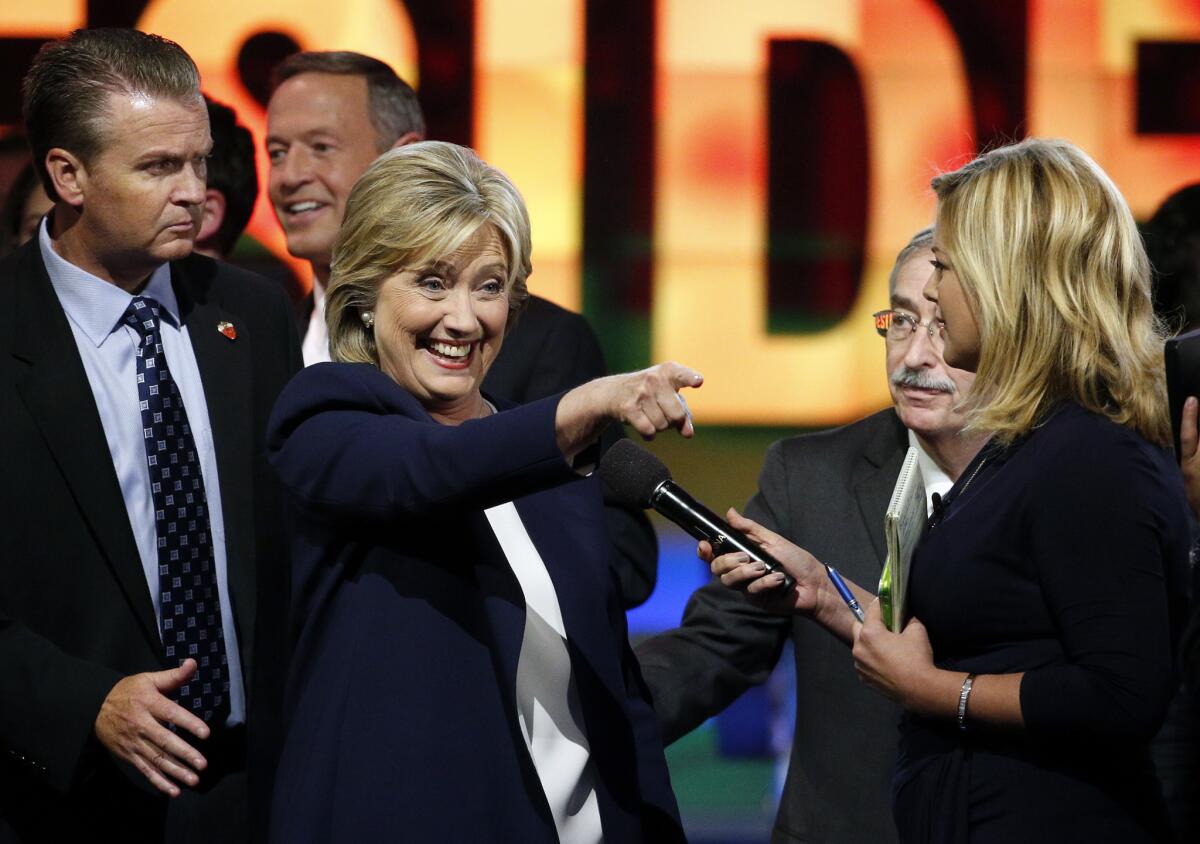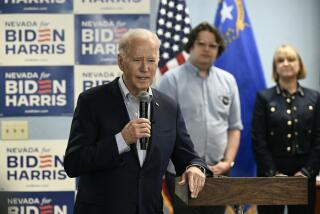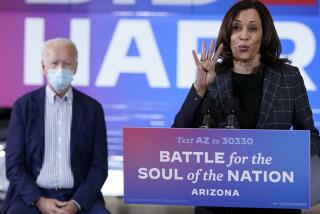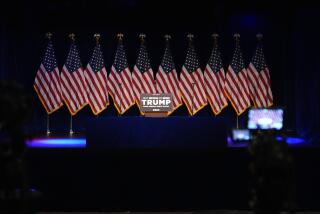Hillary Clinton hopes to make diverse Nevada her campaign bulwark

Hillary Rodham Clinton after the Democratic presidential debate in Las Vegas.
For Hillary Rodham Clinton, one of the most important audiences for the debate Tuesday night was the one here, in the city where the event took place.
With Clinton’s main opponent, Sen. Bernie Sanders of Vermont, threatening to beat her in New Hampshire and posing a significant challenge in Iowa — the first two contests of the primary season — Nevada has become a crucial bulwark. She is scrambling to shore up her already strong support in the state, even as Sanders seeks a way to quickly build the kind of network here that Clinton has cultivated for years.
Clinton capitalized on her strong performance, following it up Wednesday with a visit to a training facility for the International Union of Painters and Allied Trades, where the union president announced it was endorsing her.
“I am feeling really lucky in Las Vegas,” Clinton said. “Last night was a good night, today is just as good. Getting the endorsement from this union and the members you represent and what it means to really focus on the trades, it doesn’t get any better than that.”
About 30 workers stood in solidarity behind her, holding up T-shirts emblazoned with the union logo.
Soon it was time for questions from the media, and Clinton was delighted by the first one. A local reporter wanted to know whether Clinton’s eventual running mate was on the stage with her at the debate.
“I like the assumption underlying your question a lot,” Clinton said. “But I think I will wait to answer that. There is a lot of work to be done between now and securing the nomination.”
Soon after, with a swarm of media still clamoring to ask more questions, Clinton’s handler announced there was no more time and the candidate was whisked off to a big rally on the other side of town. There would be a quick stopover on the way at an ice cream shop for some retail politicking.
Nevada could play a crucial role in the primaries. It is not the first state to vote. Or the second. But as the nation’s demographics shift, its diverse electorate may be a more meaningful test for the candidates than the overwhelmingly white voting populations of Iowa and New Hampshire.
“You go to New Hampshire and there are not any minorities there,” Nevada Sen. Harry Reid, who has yet to endorse in the presidential race, said at a panel discussion on the eve of the debate. “Nobody lives there.”
Iowa is pretty much the same, Reid said. “We are a state that is representative of what America is all about.”
No candidate has poured more resources into Nevada than Clinton, and cultivating the organization here is a high priority, which Clinton demonstrated with her schedule.
Monday, on the eve of the debate, Clinton took a break from preparing in order to visit a picket line that the local hotel and restaurant workers union was conducting outside the Trump International Hotel. The brief appearance was all over the local television newscasts.
After the debate, Sanders had a brief meeting with some postal workers — the media were not invited — before heading to Los Angeles for fundraisers and an appearance on “Ellen.” Clinton stayed here for two very public events aimed at mobilizing the labor and Latino groups that loom large in the state’s Democratic politics.
“She’s connecting with people,” said Clinton campaign Chairman John Podesta. The Culinary Union, which has 55,000 members — more than half of whom are Latino — endorsed Obama in 2008, but Podesta expressed confidence about capturing the group’s support this cycle.
“We’ve invested early; we have a very strong operation here — really across the state,” he said. “The vast territory and expanse makes it a little more difficult to organize, but we feel good where we are.”
Sanders has had a strong force of volunteers, but he only recently opened an office and put paid staff into the state. He now has seven paid staffers in the state, said his campaign manager, Jeff Weaver.
The Clinton campaign, by contrast, has already reached 320,000 Nevadans through phone banks and other means, according to Antonio Villaraigosa, the former Los Angeles mayor, who was in Las Vegas on Tuesday as a Clinton surrogate. There are 22 paid staffers, many of them with deep experience in Nevada caucus organizing, and some who started work back in April.
Beyond the campaign operation, Clinton has strength in Nevada because of her long-standing popularity with minority voters, particularly Latinos, who are a key part of the Democratic electorate in the state. Latino voters strongly supported Clinton in 2008, when she lost the Democratic nomination to then-Sen. Barack Obama, and she has continued to enjoy a highly favorable image among them, polls indicate.
By contrast, Sanders, whose state has an overwhelmingly white electorate, has struggled to connect with nonwhite voters despite having positions on issues that closely resemble Clinton’s stands.
Until recently, few Nevadans had ever heard of the Vermont senator, a reality that has limited his appeal but could also provide room for his support to grow as he becomes better known.
“We have a tremendous amount of room to grow with the Latino population,” Weaver said, noting the recent endorsement of Rep. Raul M. Grijalva (D-Ariz.), who is a member of the Congressional Hispanic Caucus. “I think we’re going to do quite well with Latinos. Bernie’s personal story of being a son of an immigrant community in New York I think will be compelling.”
But Sanders is the son of Jewish immigrants from Poland. Whether his story will resonate with Latinos remains to be seen. Sanders hasn’t been talking about it much.
“He’s not really about ‘me,’” Weaver said. “At the end of the day, when people hear about his record in Congress, hear about how his political life started and how it has roots in the civil rights movement in this country … it’s going to help his candidacy.”
Tad Devine, Sanders’ chief strategist, noted that the campaign only recently had raised enough money to get that message out.
“I really think we got a great message here,” he said. “Now we’ve got to begin to deliver that message. Nevada is one of the places we are going to start doing that with the Latino community and South Carolina is a place we are going to do that with the African American community, and we’ve got a long way to go.”
Javier Panzar contributed to this report.
For more on Campaign 2016, follow @EvanHalper and @KurtisALee
MORE ON THE DEMOCRATIC PRESIDENTIAL DEBATE
Six take-aways from the Democratic debate
Clinton and Sanders clash on gun control, but agree: Enough about the emails
Who’s running for president in 2016?
More to Read
Get the L.A. Times Politics newsletter
Deeply reported insights into legislation, politics and policy from Sacramento, Washington and beyond. In your inbox three times per week.
You may occasionally receive promotional content from the Los Angeles Times.








